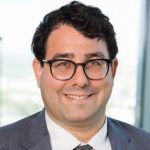Vanderbilt Law School alumni reflect on their clinic experiences, discuss how the clinics influenced their careers, and offer advice to current students.
 Judge Sheila Calloway, JD ’94
Judge Sheila Calloway, JD ’94
Davidson County Juvenile Judge
Criminal Practice Clinic Alumnae
How did your clinic experience impact the trajectory of your career as a lawyer?
When I started in the summer of my 2nd year as an intern with the Criminal Practice Clinic, I was still unsure about which area of law I wanted to practice after graduation. After having the opportunity to represent individuals in court, meeting with my clients both in jail as well as in the office, and working on appeals, I knew that I wanted to practice criminal law as an attorney. There is no question that my clinic experience solidified my career choice.
What is one thing you learned in Clinic that you could not have otherwise learned in your doctrinal classes?
While working in the criminal clinic, I actually had the opportunity to argue my client’s case to the Tennessee Criminal Court of Appeals. It was definitely a life-changing moment. I learned how to truly defend a client on an appeal. It further helped me learn how to prepare for arguments for an appellate court as well as thinking on my feet and formulating appropriate arguments.
What words of wisdom can you share for current clinic students?
For all current clinic students, I would encourage you to make the most of the opportunity. Clinic students should use this opportunity to learn as much as possible about the particular area of law and determine if it is what you want to do for a career. It is also a great opportunity to network with attorneys and court personnel who may be helpful for you as you enter into the legal field. Finally, always remember that the client’s you serve deserve the best you can give them.
 Mike Tackeff, JD ’18
Mike Tackeff, JD ’18
Associate in the Litigation & Dispute Resolution Practice Group, Bass Berry & Sims
Immigration Practice Clinic Alumni
How did your clinic experience impact the trajectory of your career as a lawyer?
Working in the clinic gave me invaluable perspective on client service. When your client doesn’t speak English, explaining the complexities of the immigration system is a real challenge. You are forced to figure out quickly what is essential and what is not. You also learn how to keep asking questions – have I gotten all of the information I need to litigate this person’s rights? How can I build trust with someone who is new to this country?
What is one thing you learned in Clinic that you could not have otherwise learned in your doctrinal classes?
Being in the clinic helped me to build my client service skills, but also helped me to take ownership of a case. Thinking beyond the discrete tasks of mastering X or Y doctrine is an important skill – what will this case need in 6 months or in 12 months? How do I lay the foundation now for what the next student will need later? It felt great to take on a case and think through those kinds of steps beyond just the next exam.
What words of wisdom can you share for current clinic students?
Remember that you are building on work other lawyers have done, and remember that you are not the last person to work on these cases. That’s helpful because you are not alone, though you are responsible for the matter. I tried to leave all my files better than I found them!
 Emily Burgess, JD ’22
Emily Burgess, JD ’22
Law Clerk for The Honorable Travis McDonough, Chief Judge, United States District Court, Eastern District of Tennessee
Youth Opportunity Clinic
How did your clinic experience impact the trajectory of your career as a lawyer?
Clinic opened up a new potential career path for me. Because “public interest law” is such a broad and amorphous umbrella, it’s hard to know what exactly a “public interest lawyer’s” day-to-day life looks like. The reentry work I did in the Youth Opportunity Clinic offered me a glimpse into a subset of public-interest work I had not known much about but that I now see as a viable way to use my law degree to support my community.
What is one thing you learned in Clinic that you could not have otherwise learned in your doctrinal classes?
The value of empathy and compassion. Not in a touchy-feely, warm-and-fuzzy kind of way, but in a highly practical “my client won’t confide in me unless she feels genuinely heard” kind of way. In law school, these skills can be undervalued and even actively discouraged. But in clinic, we had readings early on about the importance of exercising empathy and compassion, and I often had conversations with my clinic partner and Professor Suvall about what it looks like to integrate those skills into our advocacy.
What words of wisdom can you share for current clinic students?
Get to know your clinic partner. No matter which clinic you are in, it is not unlikely you and your partner will find yourselves in challenging and emotionally taxing situations. Taking the time to get to know your partner outside clinic can allow you to lean into these difficult moments together, feel comfortable offering valuable feedback to each other, and may even lead to a wonderful new friendship.